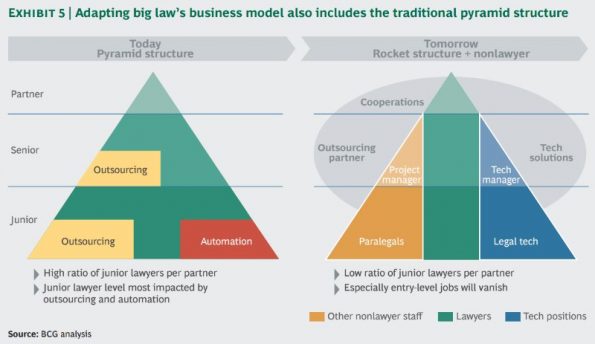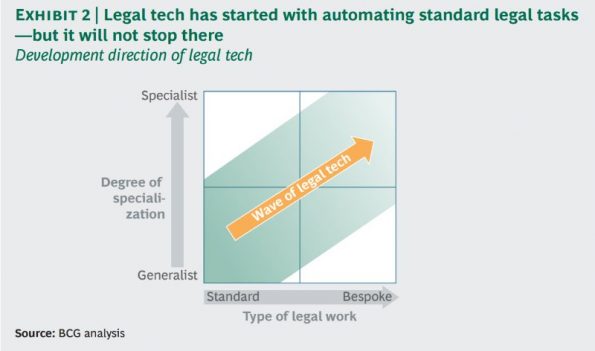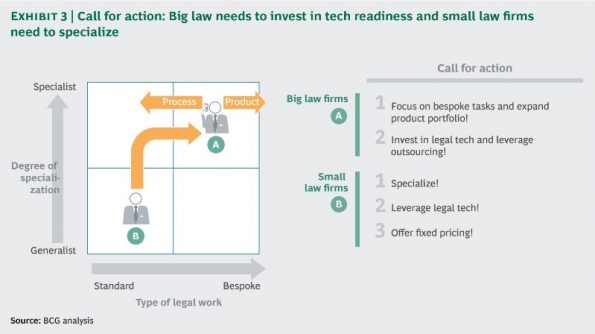Recently, the Boston Consulting Group and the Bucerius Center on the Legal Profession published their report on the state and future of legal industry.
The key takeaways?
Market forces are REAL
Tendencies that many law firm partners used to discard as (hopeful?) fads are here to stay. How comes, you ask? Well, let’s consider:
- Legal Process Outsourcing is peaking, and the ceiling to its growth is nowhere to be seen. Some of the most notable players in the field started acquiring prominent law firm offices, to further fuel their growth (yes Axiom Law, I am pointing at you);
- Additionally, in-house legal departments have started internalizing many standardized and low-value tasks. Effectively they withdrew billions (yes, figure with the “B”) of USD from the market;
- General Counsels are being accompanied by procurement specialists during law firm pitches (signals the ever-increasing price/value sensitivity);
- Peculiar clauses in engagement letters (segments of work rated at the zero charge, e.g. for the associate level of work).
At the same time, volume of work increases exponentially. But this does not translate to more hours billable for law firms.
Conversely, law firms are advised to abandon the hourly rates.
Firms which continue to charge by the hour run a great risk of pushing their corporate clients towards more agile and forward thinking law firms.
“To secure their future competitiveness, law firms must reconstruct their business model to capture the opportunities presented by legal technologies.”
– the BCG & Bucerius Law School report
Reconstructing the business model? What does this mean?
It seems easy to tell law firm partners they need to change their ways of work.

But I see how this makes so little sense without the prevalent “WHY”:
- No 1 goal is to remain competitive and transform the practice to fit new (mentioned) market forces;
- Market forces clearly require firms to abandon hourly-based practices (if you do not feel the urge today, you will in a year time);
- Before using fixed fees, you need to change how your firm works (processes, efficiency, effectiveness – all of which barely considered when clock was in its heyday);
- In order to boost internal efficiency, you must choose the kind of work you want to stay focused on (you ARE what you repeatedly DO – same is true for your organization);
- After boosting efficiency, you will be able to offer more competitive prices, and at the same time capture the upside of the value.
How to deconstruct and re-position?
Break your projects into small units, and fit them in one of the two boxes (standardized or bespoke?) before you execute.
This may feel difficult for the so-called “Full-Service Law Firms“, and I hope the below points will help you a bit:
1) Change attitude and realize you are one of many providers.
2) Reflect on work you (and your firm) do and tell apart standardized services from the bespoke services;
3) Break complex projects down until you get units of work which can not be broken down any further. Set them into one of the categories (standardized / bespoke).
After you are done, you should strategically decide how to (re)-position yourself and your firm. For example, do you want to:
a) Gear towards owning the standardized work (i.e. the supplier of the standardized results / solutions); or
b) Own the bespoke work (i.e. the supplier of the highly bespoke solutions – assisted by technology and by suppliers of the standardized solutions)?
“Advances in legal tech will accelerate current trends in the decomposition and outsourcing of legal work.”
– the BCG & Bucerius Law School report
Why should you adopt legal technology solutions today?

Legal technology solutions are constantly developing and becoming more comprehensive.
As a result, if you ignore technology for too long, you risk having your (tech-savvy) competitors deliver much more value than you, simply because they:
- Can communicate between their project team and clients seamlessly;
- React much more promptly and deliver (even highly bespoke) solutions in a way shorter turnaround time; and all at
- Much more competitive prices than yours.
You will wonder what got you in the process.
“Progressive law firms stand the best chance of emerging as winners. Meanwhile, generalist practices face a serious risk of disruption, being edged out of the market by law firms that leverage technology.”
– the BCG & Bucerius Law School report
What else can you do to prepare for the future?

Revisit your value proposition – Many law firms are going out of their way describing how/why they are different than their competitors.
Why not try to actually BE different instead? For example:
- Project Management as a part of service: Take the burden of monitoring progress from your clients, by internalizing project management and budget planning;
- Become trusted Outsource Manager: Decompose complex projects, keep the bespoke pieces (where you add the most value). Outsource the rest, keep the costs low, and remain accountable for the end result;
Reconsider your current revenue model – Changing the revenue model from billable hours to fixed pricing will have significant implications on your incentive structure.
It will motivate your organization to be more efficient and effective.
This article was originally published on LinkedIn by Ivan Rasic and is re-published here with the permission of the author.
Ivan Rasic is the co-founder and CEO of LegalTrek. Ivan holds a double-degree LLM in Law and Finance from Goethe University in Frankfurt, Germany. As a lawyer and “intrepreneur” at Philip Morris Services, he developed a tool for enhancing communications between the company’s general counsel and its outside attorneys. He serves as a business mentor to Law Without Walls, a community of entrepreneurs, legal practitioners, law professors, and law students focused on innovation in the legal sector.




